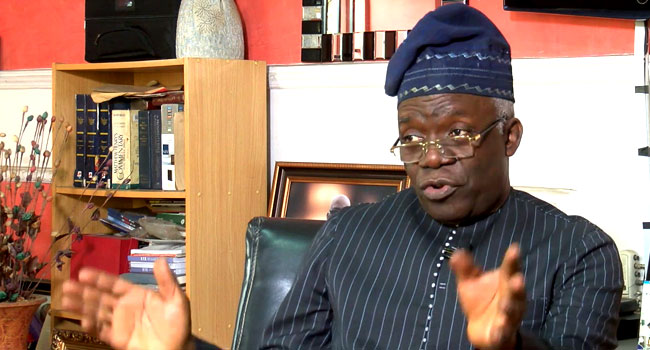Human rights lawyer, Femi Falana, has warned that some state governors will use state police as a means of oppression.
Falana, a Senior Advocate of Nigeria (SAN), stated this in an interview on Channels Television on Friday.
He said there must be proper guarantees under the law to prevent situations where governors use police apparatus to intimidate and oppress political opponents.
According to Falana, policing has been decentralised in the country as residential estates and communities have private security outfits with personnel armed with different weapons guarding the inhabitants of such communities.
He said the jurisdictions of state police must be clearly defined to prevent inter-rivalry and more clashes between security agents, adding that state police must be a people-police service and not a government-centred one.
He said the success of the country’s policing system depends on its management.
Falana said, “Unfortunately, our governors have allowed the Nigeria Police Force to become the Federal Government Police Force, hence the demand for state police.
“Under Section 216 of the Constitution, the President of the Republic cannot appoint or remove an Inspector General of Police without consulting the Nigeria Police Council.”
“In that 39-member body, 36 of them are chief executives of states. It’s a council where the members should discuss the number of police personnel in every state, how the police should be funded and how the police should be managed and administered. But what has happened?”
Falana said though there are other regular security council meetings in the country, the Nigeria Police Council has not been meeting.
He said, “We must go back to the provisions of the Constitution. It’s not unusual in a federation to have federal government police and state police but again, we have to go back to the drawing table and fine-tune our policies before we have state police. We must assure our people.
“There are governors in Nigeria that will turn state police into an instrument of oppression because even right now, the federal police is turned into an instrument of oppression.
“So, we must agree that in a Federation, every tier of government, every federating unit should be able to enforce its own laws, with its own security apparatus, but you must guarantee that there will be no intimidation or oppression of political opponents, either by the federal government police, state police or even local government police.
“Right now, we deceive ourselves, we already have decentralisation of police; every community, every estate all have their own private security arrangements, and majority of them are armed.”
Recall that calls for state police have been on recently, with some governors and regional socio-political groups like Afenifere and Ohanaeze Ndigbo saying it would curb the menacing trend of kidnapping, banditry and other crimes.
President Bola Tinubu and the governors of the 36 states in mid-February, agreed on state police as a method to curb the escalating security challenges in the country.
About a month later, 16 governors submitted their reports to the National Economic Council (NEC), expressing their support for the creation of state police and the amendment of the 1999 Constitution to allow for the same.
But, the decisions of the remaining 20 governors are yet to be made public.






